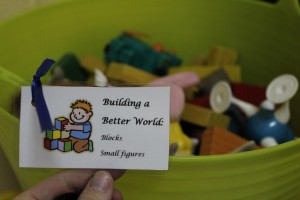As parents, we convey our values to our children through what we have in our homes. The toys, books, clothes and even foods we give our children will influence their opinions of what is acceptable in our family as well as their perceptions of the world.
In today’s society, children are being increasingly targeted by media to become consumers and buy into a materialistic reality that values beauty, power, entertainment, and wealth above moderation, justice, service to others, and spirituality. Children are bombarded with messages through not only advertisements but children’s products as well about what it means to be a successful person by the world’s terms. Even products labeled “educational” are not necessarily safe from promoting certain ideals which, upon careful inspection, fall short of the high standards set in the Baha’i Teachings.
One way we can guard our children from accepting these notions (and teach them how to investigate truth instead of be swayed by marketing) is to be intentional about what we buy and use in our own homes. Study of the Holy Writings as well as the recent messages from the Universal House of Justice can enlighten us and help us carefully examine our current possessions and spending habits regarding these topics.
Below are just a few thoughts to consider when choosing items for your children to use and play with. If you would like to download these questions and quotations to print out and keep for a reference, you can do so at the end of this post.
Questions
 Does this item nourish my child’s creative spirit? (will it encourage my child to imagine or problem solve)
Does this item nourish my child’s creative spirit? (will it encourage my child to imagine or problem solve)
- Does this item promote good character? (will it bring out peaceful behavior or competitive/destructive behavior)
- Does this item enforce materialistic notions? (does it promote brands, characters from the media, or culturally biased moral standards or conceptions of beauty)
Quotations
“What needs to be appreciated in this respect is the extent to which young minds are affected by the choices parents make for their own lives, when, no matter how unintentionally, no matter how innocently, such choices condone the passions of the world—its admiration for power, its adoration of status, its love of luxuries, its attachment to frivolous pursuits, its glorification of violence, and its obsession with self-gratification. It must be realized that the isolation and despair from which so many suffer are products of an environment ruled by an all pervasive materialism. And in this the friends must understand the ramifications of Bahá’u’lláh’s statement that “the present-day order” must “be rolled up, and a new one spread out in its stead.”
(Universal House of Justice, 28 December 2010, paragraph 33)
“Training in morals and good conduct is far more important than book learning. A child that is cleanly, agreeable, of good character, well-behaved — even though he be ignorant — is preferable to a child that is rude, unwashed, ill-natured, and yet becoming deeply versed in all the sciences and arts. The reason for this is that the child who conducts himself well, even though he be ignorant, is of benefit to others, while an ill-natured, ill-behaved child is corrupted and harmful to others, even though he be learned. If, however, the child be trained to be both learned and good, the result is light upon light.”
(Abdu’l-Baha, Selections from the Writings of Abdu’l-Baha, p. 135)
“An educational process that dilutes content in a mesmerizing sea of entertainment does them no service. We trust that, in studying the institute courses, teachers and animators will find themselves increasingly equipped to make judicious decisions in selecting any materials or activities necessary, whether from traditional educational sources or from the wealth of items, such as songs, stories, and games that are sure to be developed for the young in the Baha’i community in the years to come.”
(Universal House of Justice, 12 December 2011, page 6)
[box type=”download”] Download the Questions and Quotations to Consider.[/box]
These are just a few questions and quotations from one perspective. We would love to hear how you set the standard in your own home.
What other considerations do you have when choosing what to buy for your child? Please share in the comment section below.